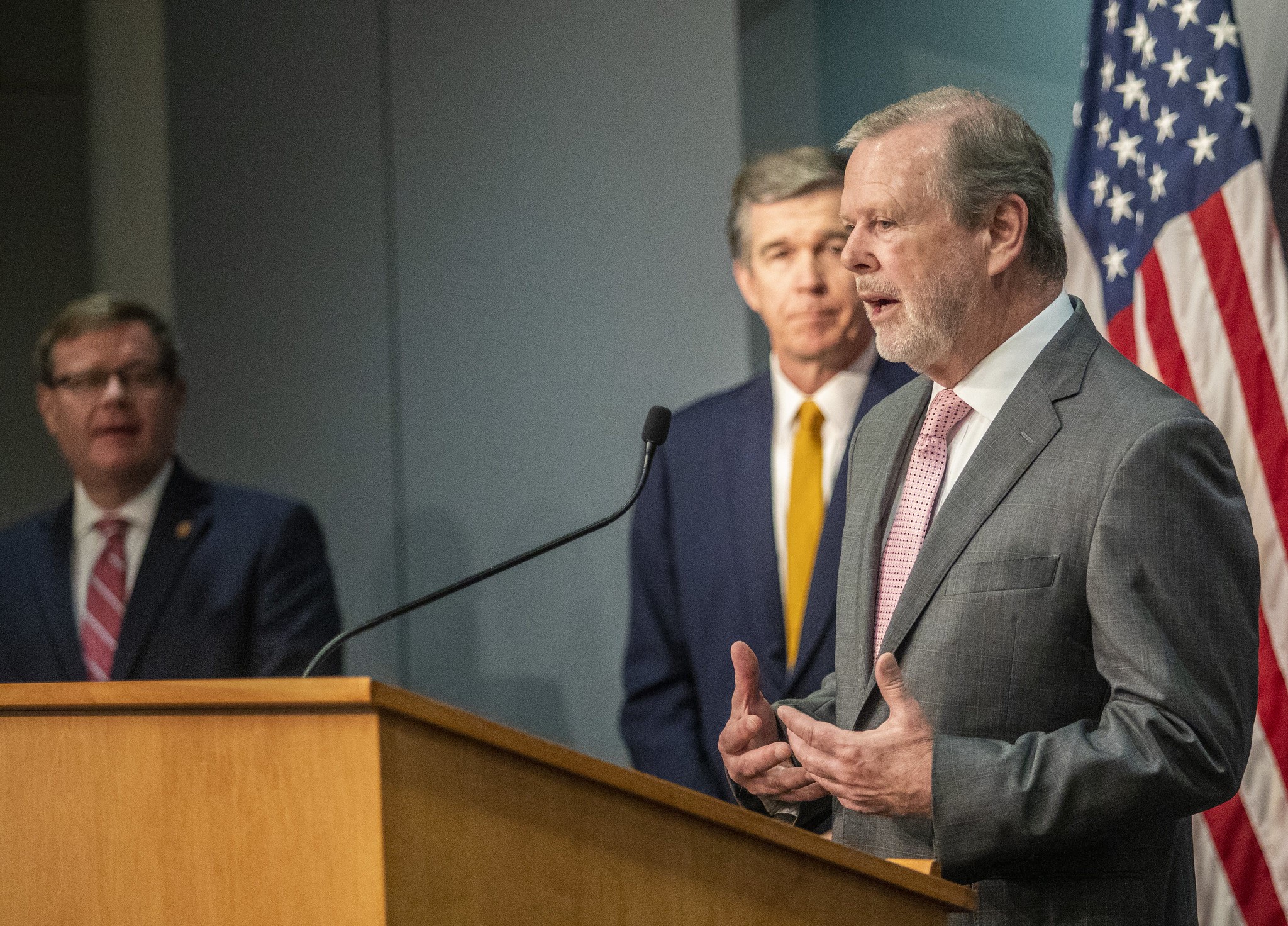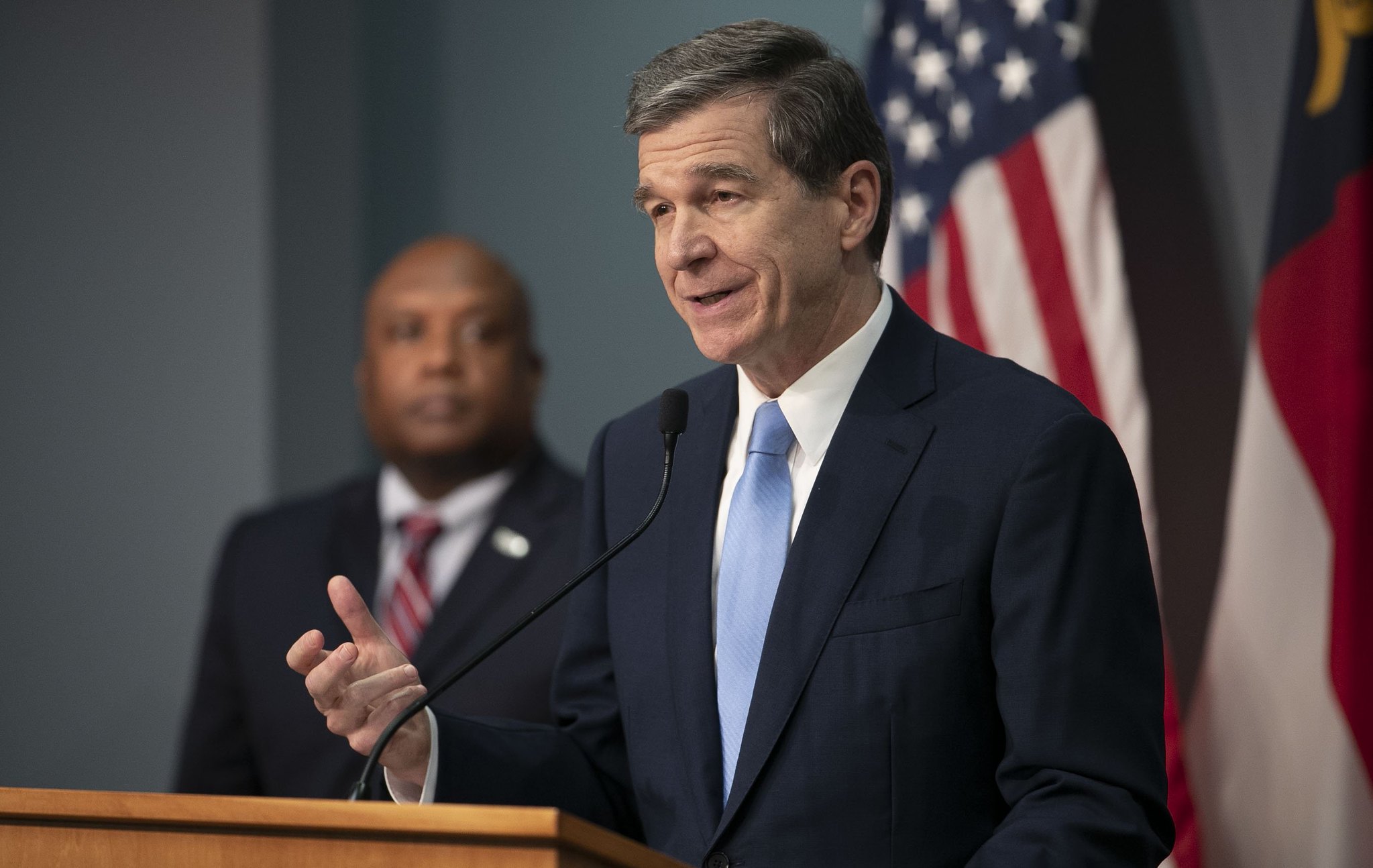North Carolina Governor Roy Cooper passed his latest executive order in an effort to protect public health amid the ongoing COVID-19 pandemic.
Thursday’s executive order, which Cooper announced at a press conference from the state’s Emergency Operations Center, has three elements. The first mandates new policies for retail stores to ensure customers are socially distanced, the second enacts stricter requirements on nursing homes to prevent outbreaks and the third is an effort to get more unemployment claims processed faster.
Cooper shared some of the details of the physical distancing requirements for retail stores.
“Stores may not have a number of people inside at one time that is more than 20% of the stated fire capacity or either 5 people for every 1,000 square feet,” he said. “Stores must also mark 6 feet of distance at places where people need to gather, like checkout lines, and they must perform frequent environmental cleaning and routine disinfection.”
In addition, Cooper said stores must make hand sanitizer readily available for customers, mark aisles as one-way and to set designated times for at-risk residents to shop.
The second prong of the governor’s order is enacting mandatory protective measures for nursing homes, building upon the guidance already issued to skilled nurse institutions and long-term care facilities. The increased measures require closing communal spaces, all staff using face masks and both residents and staff being checked daily for symptoms of COVID-19.
“We’re focusing efforts on these congregant care institutions since the nature of the virus makes them easy targets for outbreaks,” said Cooper.
The requirements become mandated just one day after Cooper and state health officials shared more than 60 positive cases of COVID-19 have been reported at a long-term care facility in Orange County, PruittHealth – Carolina Point.
Dr. Mandy Cohen, the Secretary for North Carolina’s Department of Health and Human Services, said while the order is specifically for long-term care facilities and not adult care homes or assisted living communities, she said the measures are currently targeted for skilled nursing facilities.
“We want them as much as possible to follow these same recommendations, but they are not required at this time,” she said.
The final element of the new executive order allows for unemployment claims to be filed faster, as many North Carolinians have been laid off as restaurants have moved to take-out options and many businesses closed due to the stay at home order.
Cooper said Thursday around 497,000 unemployment claims have been accepted in North Carolina since March 16.
“Time is critical and precious for those who are out of work,” said the governor. “I, my staff, and the Secretary of Commerce, are pushing the [Division of Employment Security] to move as fast as possible. Every claim is important and represents an unemployed worker on the edge. Their families and our economy need these funds as quickly as possible.”
While not part of the executive order, both Cooper and Cohen spoke about the various religious holidays residents will be or already are practicing this weekend. While both stressed the difficulty of being apart from others during such meaningful holidays, they encouraged families and friends to still remain physically distanced from others.
“Our traditions are steeped in being together,” said Cohen. “This year though, the best way we can show our love for our friends and family is to find new ways to be together.”
Cooper’s executive order will go into effect Monday, April 13, at 5 p.m.
Photo via NC Department of Public Safety.
Note: 97.9 The Hill has been Chapel Hill and Orange County’s daily source for free local news since 1953. Please consider making a contribution to continue supporting important local journalism like this.
Related Stories
‹

Bill to Reopen NC Gyms, Bars Sent to Skeptical Governor After Passing HouseThe North Carolina legislature passed another bill on Wednesday overturning parts of Gov. Roy Cooper’s executive order that keep certain businesses closed to discourage the spread of COVID-19. As with previous legislation sent to him seeking to reopen bars, Cooper is also likely to veto the latest measure, which also ends the shuttering of gyms […]

Trump Threatens to Move RNC Without Assurances from Governor CooperPresident Donald Trump threatened Monday to pull the Republican National Convention out of North Carolina if the state’s Democratic governor doesn’t immediately sign off on allowing a full-capacity gathering in August despite the ongoing COVID-19 pandemic. Trump’s tweets about the RNC, planned for Charlotte, come just two days after North Carolina recorded its largest daily increase in […]

NC Judge Blocks Governor's Virus-related Orders on ChurchesA federal judge in North Carolina on Saturday sided with conservative Christian leaders and blocked the enforcement of restrictions that Gov. Roy Cooper ordered affecting indoor religious services during the coronavirus pandemic. The order from Judge James C. Dever III came days after two Baptist churches, a minister and a Christian revival group filed a […]
![]()
Prison Workers Get Free Testing; Gear Going to Nursing HomesThe North Carolina government is offering widespread testing or protective equipment to workers in two of the more vulnerable living settings for COVID-19 outbreaks. The Department of Public Safety unveiled on Thursday a plan to make free testing available starting next week to over 21,000 employees in state prisons or juvenile facilities or those who […]

Sen. Berger Asks Gov. Cooper to Let Counties Reopen BarbershopsOne of North Carolina’s most powerful Republican elected officials has called on Democratic Gov. Roy Cooper to give county governments the ability to reopen barbershops and hair salons now. Senate leader Phil Berger said on Wednesday that most Southeastern states have allowed these personal service businesses to reopen in some capacity. They are mostly run […]

Governor Cooper Defends Rules for Businesses, ChurchesStating “pandemics cannot be partisan,” North Carolina Democratic Gov. Roy Cooper on Tuesday defended his eased stay-at-home order as criticism mounted from elected Republican officials and demonstrators who gather weekly outside his home. Cooper’s altered COVID-19 order, which took effect Friday, allowed more businesses to open to customers as long as social distancing rules are […]
![]()
Health Chief: NC Church Service Restriction Being ReviewedNorth Carolina legislators and leading sheriffs want Gov. Roy Cooper to clarify or remove a portion of his executive order that limits how religious services can convene under his eased stay-at-home rules for COVID-19. Cooper’s health and human services secretary said on Monday that state lawyers and others are taking a second look at the language […]
![]()
Virus Directives Mean Hundreds More NC Prisoners Go HomeNearly 200 inmates within North Carolina’s prison system have been allowed to serve the rest of their sentences outside of prison to discourage the spread of COVID-19, state officials said Thursday. The Department of Public Safety released figures showing how it is carrying out an initiative announced last month to allow some prisoners, including those at […]

Gov. Cooper: North Carolina to Move to Phase 1 Beginning FridayNorth Carolina Governor Roy Cooper said he will sign an executive order for the state to enter Phase 1 of lifting the restrictions issued during the COVID-19 pandemic. Cooper said North Carolinians’ efforts to stay home, use face coverings and physically distance themselves when in public have affected the virus’ spread enough to move into […]

North Carolina COVID-19 Package Gets Final General Assembly OKThe General Assembly on Saturday finalized a relief package to address the new coronavirus pandemic in North Carolina, agreeing to send money to schools, hospitals, local governments and researchers. A pair of bipartisan measures approved unanimously by the House and Senate direct how nearly $1.6 billion in federal COVID-19 funds are distributed and how scores […]
›









